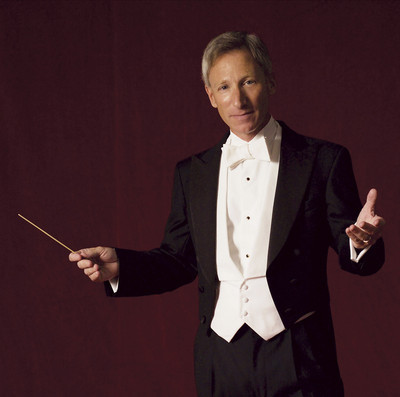Musical Mazel Tov
"Israel will endure and flourish. ... It is the child of hope."
-- John F. Kennedy
Philharmonically speaking, it's the celebration of a nation.
"This is an enormous world event, Israel's 60th anniversary," says David Itkin, musical director of the Las Vegas Philharmonic. "Las Vegas has a very large and really vibrant Jewish community. A lot of orchestras are doing something for Israel's anniversary that amounts to playing one Israeli piece in one concert during the year. I wanted to do something more than that."
"More" amounts to Sunday's Israel@60 Gala Concert pairing the Philharmonic with Jewish performers at Artemus Ham Hall at the University of Nevada, Las Vegas. (In a busy weekend for the Phil folks, the Saturday premiere of the Pops series stars trumpeter Byron Stripling in a tribute to Louis Armstrong.)
"We had to have a large amount of material written just for this night," Itkin says about the Israeli-themed event. "When you take the traditional Israeli song or a few bits of liturgical music, there are no orchestrations for them, so I've done most of the arranging myself. It's kind of exciting to have so much that's new going on."
On the anniversary bill are four Vegas cantors: Marla Goldberg (Temple Sinai), Philip Goldstein (Congregation Ner Tamid), Daniel Friedman (Temple Beth Shalom) and Andres Kornworcel (Midbar Kodesh Temple) in a salute staged just after the conclusion of Yom Kippur. They'll be joined by mezzo-soprano Eugenie Grunewald, klezmer clarinetist Shelley Hanson and the Adelson Educational Campus Choir.
But the evening's most intensely personal and emotional moments probably will come courtesy of Las Vegas tenor Nathan Brian Wine, who'll dedicate his interpretation of "Eli, Eli" (pronounced "EL-e, EL-e" and meaning "My God, My God") to his mother, Ann, a Holocaust survivor.
"It was a song, a plea, a prayer of all of the Holocaust victims who knew they were destined for certain death, but still a prayer of optimism that God would save them," Wine says. "It comes from the 22nd Psalm, best known in the Christian religion as the cry of Christ on the cross, or 'The Seven Last Words of Christ.' "
"Eli, Eli," with music by David Zehavi, is based on the work of late poet/paratrooper Hannah Szenes, a Hungarian Jew and member of a resistance movement, trained by the British military to parachute into Yugoslavia to rescue fellow Jews about to be deported to Auschwitz. But Szenes, who was only 23, was captured at the Hungarian border, imprisoned and tortured, which failed to break her as she refused to reveal details of her mission. She was subsequently tried and executed by firing squad. She's regarded as a national heroine in Israel, where several streets and a kibbutz bear her name, and her poetry is widely read. Her remains were relocated to Israel in 1950.
Translated into English, a portion of "Eli, Eli" reads:
"My God, My God, why hast thou forsaken me?; With fire and flame they have burnt us; Everywhere they have shamed and derided us; Yet none amongst us has dared depart; From our Holy Scriptures, from our Law."
"I can take the grandeur that the symphony evokes to match the emotion of the words," says Wine, who orchestrated the piece and describes his parents' lives during World War II as fleeing from country to country, "with the grace of God, always one step ahead of the Nazis."
"Israel came with a price, it all began with the war when Hitler decided to turn the world into a graveyard," Wine says, recalling how "Eli, Eli" was almost unbearably meaningful to his mother. "She wanted me to learn this piece ever since I could remember. She could never tell me about it, she'd just nod her head, like it was her way to tell me she couldn't talk about it without breaking down. But she'd tell me from time to time, 'You're going to learn this piece because you're going to learn where I came from.' "
Elsewhere on the program, Grunewald will offer an interpretation of "Lamentation," the final movement of Leonard Bernstein's "Jeremiah Symphony," describing the destruction of The First Temple of Jerusalem in 586 B.C.
"It was chosen because of the text and it's really beautiful, basically a long aria, about 10 minutes," says Grunewald, who will perform the movement in Hebrew. "To me, it's a beautiful language, it has a music all its own."
Goldstein, one of the quartet of cantors, will contribute two pieces. "I'm doing a prayer for peace and a song of the (1973) Yom Kippur War, which talks about how beautiful the land is and how peaceful things are, that nevermore shall we know war -- it's a reflective piece," Goldstein says.
"Hopefully, people will take away from this concert a sense of unity and celebration. It's the pride Jews all over feel for having our homeland and the pride in the people and the culture. What that country has accomplished in 60 years is truly amazing."
"In Israel, in order to be a realist, you must believe in miracles."
-- David Ben-Gurion
Contact reporter Steve Bornfeld at sbornfeld@reviewjournal.com or 702-383-0256.
PREVIEW what: Israel@60 Gala Concert when: 8 p.m. Sunday where: Artemus Ham Hall, University of Nevada, Las Vegas, 4505 S. Maryland Parkway tickets: $30-$90 (895-2787)















